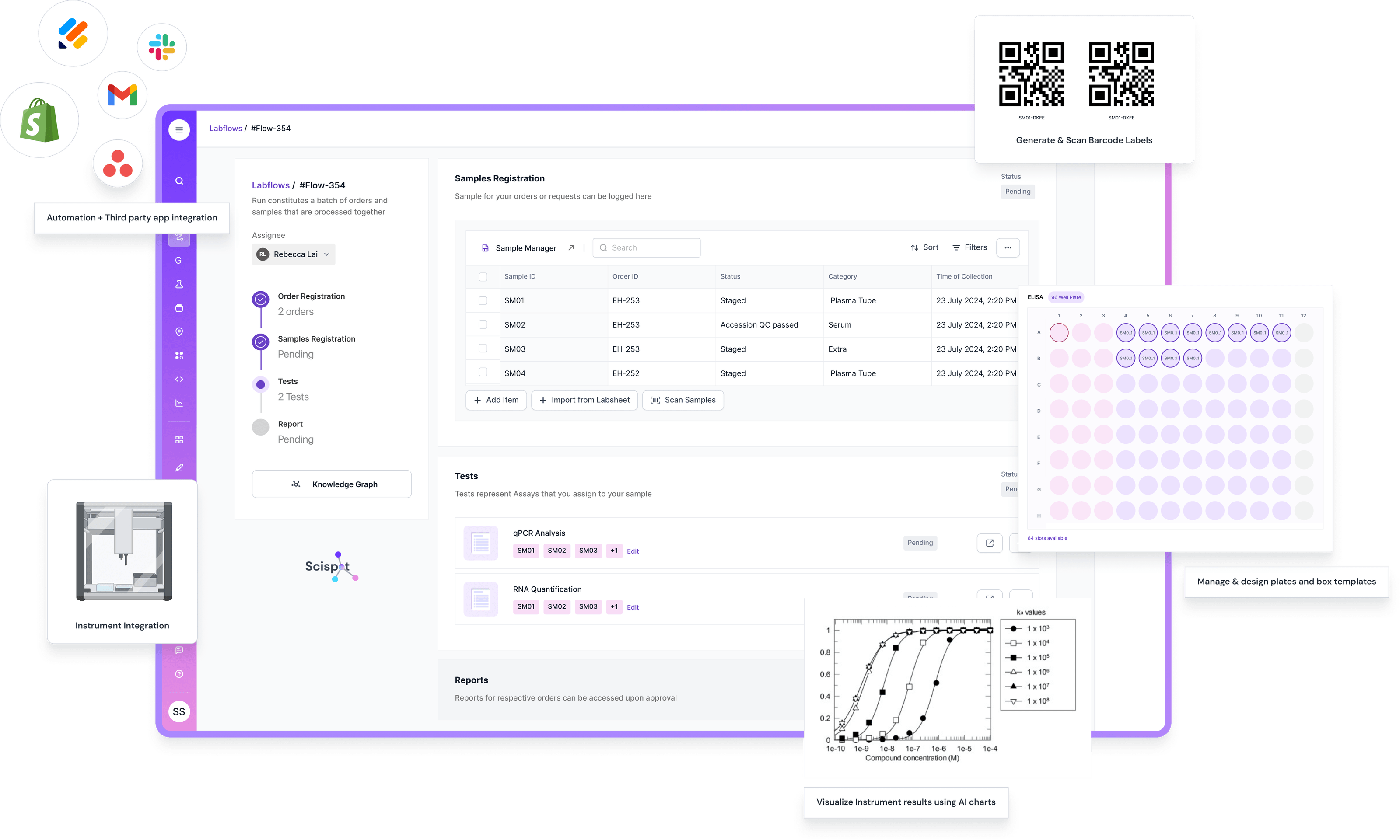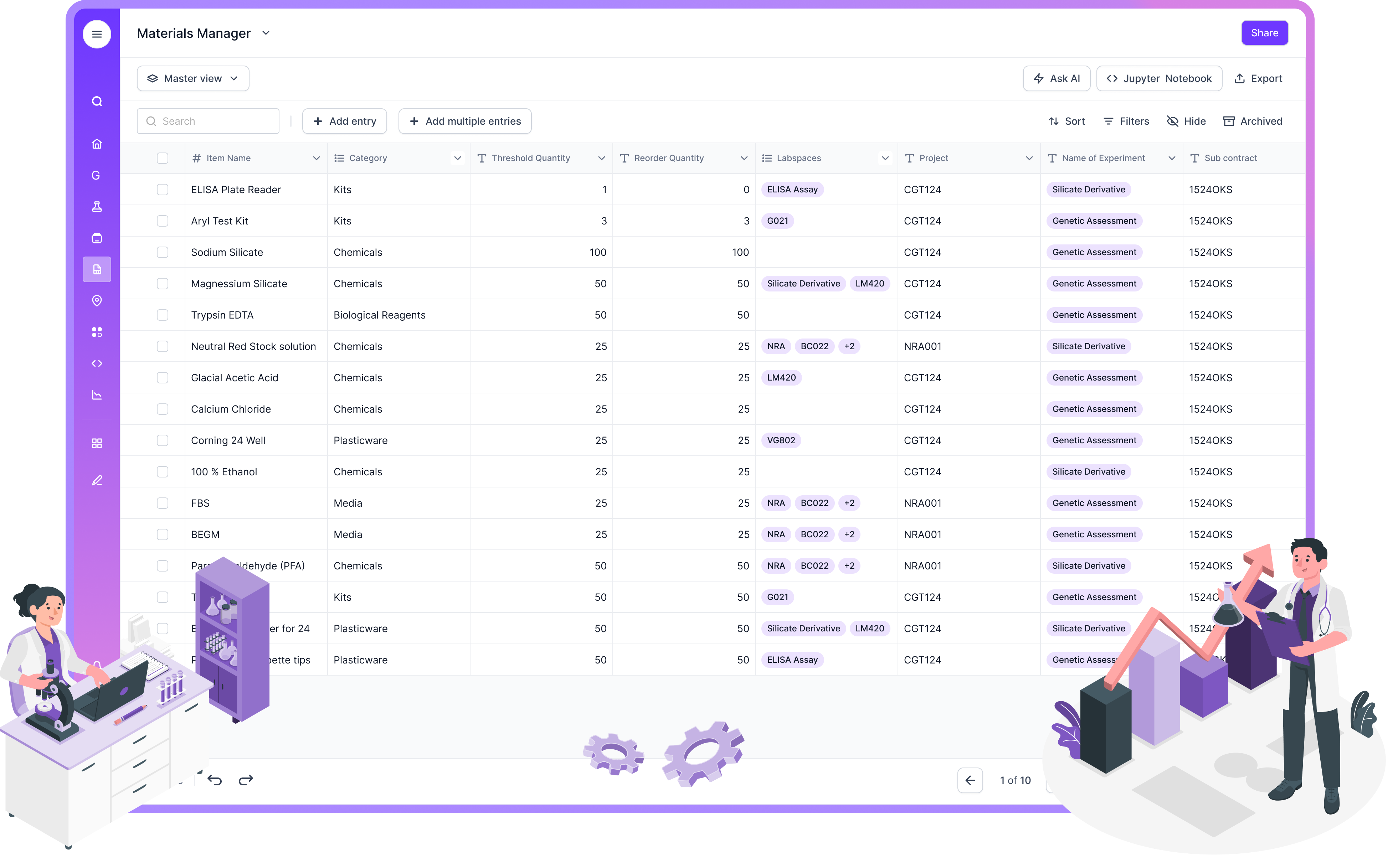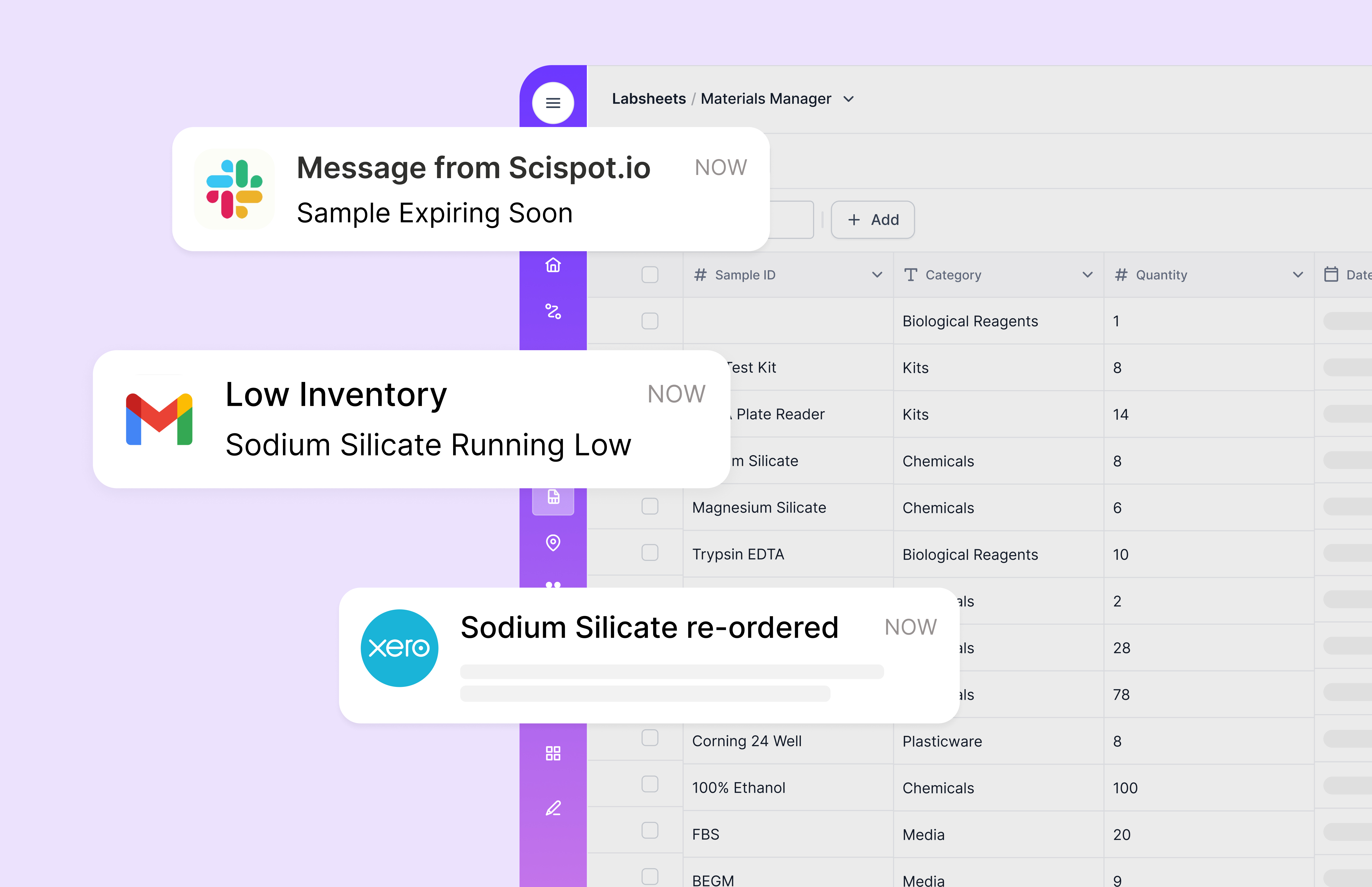Introduction
In today’s data‑driven laboratory environments, leveraging a robust Laboratory Information Management System—or LIMS—is no longer optional. The right LIMS transforms how a lab manages samples, workflows, instruments, and data, turning operations from reactive to proactive. With measurable improvements in productivity, error reduction, compliance, cost-effectiveness, and scalability, the benefits of LIMS are compelling. In this article, we’ll walk through ten key benefits of LIMS and show why Scispot emerges as the smart choice when your lab decides it’s time to upgrade.

1. Streamlined Sample & Workflow Management
One of the most essential benefits of LIMS is the ability to oversee the full lifecycle of a sample—from intake, through testing, to storage and disposal. In a lab without such a system, issues such as mislabelling, duplicate entries, lost samples, or delays due to manual handoffs often create bottlenecks. A modern LIMS brings structure: sample accessioning, barcode or RFID tracking, workflow templates, status update,s and automated routing of the sample through the necessary analyses. With the right system in place, each stage of a sample’s journey is defined, monitored, and controlled.
Scispot’s platform offers highly configurable workflows, meaning your lab can set up templates and automate each step of sample handling with minimal manual intervention. These workflows help ensure consistency, efficiency, and scalability—even as sample volumes grow or workflows diversify. The result: fewer manual errors, fewer delays, and a more auditable, reliable sample pipeline.

2. Data Centralization & Accessibility
A major benefit of LIMS is the centralization of your lab’s data: sample records, test results, instrument data, reagent usage, inventory, user activity, and more. When all data resides in a single system, retrieval is faster, collaboration is smoother, and information silos shrink. Laboratories become far more agile, able to respond to queries, audits, or research demands with fewer delays and fewer fragmented spreadsheets or disparate systems.
The scalability benefit is heightened when the LIMS is built for multi‑site access or cloud deployment. That’s where Scispot stands out: it is a cloud‑native platform, so users at different locations, or even remote teams, can access the same data in real time. This unified access supports multi‑location labs, collaborative research, and ensures that all stakeholders see the same version of truth—essential for accuracy, audit-readiness and informed decision‑making.
3. Automation & Reduction of Manual Errors
Manual data entry, spreadsheet‑based workflows, and disconnected systems—all are legacy risks in labs. One of the compelling benefits of LIMS is its ability to automate key tasks, thereby reducing human error. For example, instrument data can flow automatically into the system, alerts can be triggered when thresholds are exceeded, workflows can automatically assign next steps, and data can be validated in real time.
Scispot offers built‑in automation scripts and rule‑based workflows (no coding required) that help labs standardize operations and reduce the risk of error. Whether it’s validating reagent lot usage, routing test results, or flagging out‑of‑spec conditions, automation ensures consistency and frees up your team to focus on value‑add activities rather than manual tracking.

4. Enhanced Compliance, Traceability & Audit Readiness
For regulated industries—whether pharmaceuticals, food & beverage, diagnostics or environmental testing—a LIMS is critical in meeting compliance requirements. Effective sample lineage tracking, instrument calibration history, audit trails, and secure data integrity are non‑negotiable. Without these aspects, a lab faces risks of non‑compliance, data integrity failures, or inefficient audit responses.
Scispot helps labs stay audit‑ready by providing timestamped logs, electronic signatures, role‑based permissions, and full traceability across workflows. Whether you’re complying with ISO 17025, GxP, CLIA, or other standards, the benefits of LIMS in this regard are clear: one system houses your evidence of good practices, assigns responsibilities, preserves records, and supports streamlined audit cycles.
5. Real‑Time Visibility & Dashboards
When you centralize data and automate workflows, you gain visibility into your operations. One of the benefits of LIMS is that lab managers can monitor status in real time—seeing where samples are, which tests are pending, which instruments need attention, or where bottlenecks are forming. This level of insight transforms operations from reactive to proactive.
With Scispot, dashboards allow managers to see turnaround times, bottlenecks, inventory levels, instrument utilization, and more. Such real‑time insights support decision‑making that optimizes throughput, mitigates delays, and allows labs to adjust quickly. Visibility of this kind is a powerful benefit of LIMS, enabling labs to stay ahead rather than always playing catch‑up.
6. Inventory & Resource Optimization
Labs often struggle behind the scenes with reagents, consumables, instrument scheduling, freezer space, maintenance windows, and other “silent” drags on efficiency. A LIMS offers the benefit of better inventory control and resource scheduling: tracking reagent lots, expiration dates, freezer storage locations, instrument booking, and maintenance logs.
Scispot addresses these challenges by integrating inventory tracking, automated re‑ordering, equipment booking, and maintenance modules—ensuring your lab stays stocked, instruments remain maintained, and experiments don’t stall due to lack of consumables or maintenance delays. The operational continuity and cost savings from this LIMS benefit can be substantial.

7. Scalability and Flexibility for Growth
As labs expand—more samples, new workflows, more locations—older systems often buckle under the pressure. One of the critical benefits of a modern LIMS is scalability: the system grows alongside your lab instead of becoming a bottleneck. Flexibility in configuration, modular architecture, and cloud deployment all enhance this benefit.
Scispot is built on a modular architecture and cloud infrastructure, supporting both small labs and large‑scale enterprise operations. You won’t outgrow your LIMS prematurely. As sample volume increases or new workflows are introduced, the system adapts rather than forcing costly migrations or rewrites. That flexibility and future‑proofing a major benefits of choosing the right LIMS.
8. Enhanced Collaboration & Integration Across the Lab Ecosystem
Today’s labs no longer operate in isolation. They interface with instruments, analytics tools, inventory systems, ELNs, ERP systems, external partners, and even field collection teams. One of the standout benefits of a well‑designed LIMS is its ability to integrate and break down silos across the lab ecosystem, improving collaboration and data flow.
Scispot provides strong integration capabilities — APIs and connectivity to instruments and applications (250+ instruments and thousands of apps) —so your LIMS becomes the central node of your lab’s digital ecosystem. This level of connectivity means data flows seamlessly from instrument to report, between teams, across locations—enhancing collaboration across departments, geographies, and systems.
9. Faster Turnaround & Better Time‑to‑Result
Ultimately, the labs that win are those that can generate results fast, accurately, and with confidence. One tangible benefit of LIMS implementation is faster turnaround times for testing and reporting. By reducing manual bottlenecks, automating workflows, providing real‑time visibility, and streamlining sample routing, labs can significantly accelerate their time‑to‑result.
With Scispot’s automation, modern interface, and workflow templates, labs can reduce the time from sample receipt to result generation—giving them a competitive edge. Whether in diagnostics, environmental testing, food & beverage, or research, speed matters—and the benefits of LIMS in this domain are clear.

10. Data Analytics & Future‑Ready Insights
A high‑value benefit of a modern LIMS isn’t just managing what happens today—it’s enabling insights that shape tomorrow. When your sample, instrument, workflow, and outcome data are clean, centralized, and standardized, you unlock the ability to apply analytics, uncover inefficiencies, forecast demand, optimize processes, and drive strategic decision‑making.
Scispot goes beyond traditional LIMS capabilities by embedding AI‑powered tools and analytics that turn your lab data into actionable insights. This elevates your lab from reactive operations to proactive innovation—one of the most significant benefits of LIMS in the modern era. With this capability, your lab is better positioned to evolve, anticipate challenges, optimize resources, and leverage data as an asset.
Why Scispot Is the Best Choice for LIMS
Having walked through the key benefits of LIMS generally, let’s underscore why Scispot deserves special consideration as your LIMS provider. Many labs stop at selecting any LIMS—but choosing the right one that aligns with modern demands and growth trajectory makes all the difference.
Scispot offers a modern, user‑friendly interface designed for minimal training and high adoption—unlike many legacy LIMS systems that remain clunky, rigid, and require heavy IT support. The no‑code customization allows labs to tailor workflows without needing heavy IT lifts or custom software development. With comprehensive integration, Scispot connects with instruments, apps, analytics, and other systems for seamless operations. It is cloud‑native and scalable, supporting both small labs and large enterprises, adapting as you grow. It is built with compliance and security in mind—offering audit trails, role‑based access, encryption, and regulatory‑ready features. Beyond serving as a backend tracking system, Scispot positions itself as an “intelligence layer” for labs, enabling smarter operations, deeper insights, and greater growth.
In short: If you want to capture all the traditional benefits of LIMS—and then go beyond into agility, automation, insight, and growth—Scispot stands out.
Conclusion
Investing in a robust LIMS is no longer optional for modern labs—it’s essential. From improved sample management, centralized data, error reduction, compliance readiness, and faster turnaround, the benefits of LIMS are clear. But as you evaluate options, choosing the right platform matters. Scispot offers all the core benefits of LIMS and elevates them with modern architecture, user‑friendly design, no‑code flexibility, deep integration, and AI‑driven insights. If your lab is ready to move forward, Scispot is a smart, future‑proof choice.
.gif)




.webp)
.webp)
.webp)
.webp)



